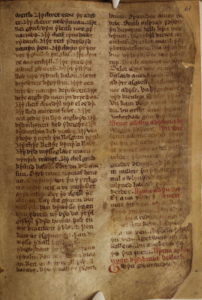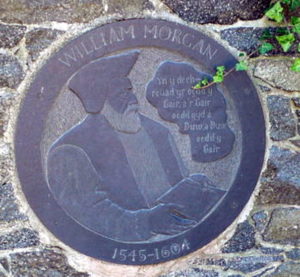威尔士语言

通过共同的语言进行交流的能力是我们所有人都认为理所当然的事情。 它是一个国家的传统和文化的一部分,然而几个世纪以来,一些语言受到了威胁,一直在努力生存。
以Cymraeg或威尔士语为例,它是不列颠群岛的一种语言,起源于古代不列颠人使用的凯尔特语。 在其历史上,它的存在面临着无数挑战。
威尔士是一种布赖顿语,意思是英国的凯尔特语,甚至在罗马人占领之前就已经在英国使用了。 凯尔特语被认为是在公元前600年左右到达英国的,在不列颠群岛演变成布赖顿语,不仅为威尔士语提供了基础,也为布列塔尼语和康尼什语提供了基础。 此时在欧洲,凯尔特语在整个大陆使用,甚至最远到了土耳其。
最早被保存和记录下来的威尔士语词汇之一,是在公元700年左右刻在历史悠久的梅里亚纳郡泰温的圣卡德凡教堂的墓碑上。 然而,第一个书面威尔士语被认为可以追溯到100年前,反映了这种语言的丰富历史。
早期凯尔特人的威尔士语成为中世纪威尔士诗人的媒介,如阿尼林和泰莱辛。 这两个人物都成为著名的吟游诗人,他们的作品被保留下来供后人欣赏。
Aneirin是中世纪早期的布莱顿诗人,他的作品被保存在十三世纪的手稿中,被称为 "Aneirin之书"。 在这个文本中,使用了旧威尔士语和中威尔士语的组合。 虽然没有人很确定这首诗的确切创作时间,但口头传统世代相传的价值在于是显而易见的。
阿内林最著名的作品《Y Gododdin》是一首中世纪的威尔士诗,由一系列为布列塔尼王国Gododdin而战的人的挽歌组成。 这些来自北部布列塔尼王国的战士被认为是在公元600年与Deira和Bernicia的盎格鲁人在Catraeth战役中死于非命。
同时,一位名叫塔利辛的吟游诗人是一位著名的诗人,曾在几个布赖顿国王的宫廷中任职。 由于许多中世纪的诗歌都是由他创作的,所以不难理解为什么他被称为塔利辛-本-比尔德或塔利辛,吟游诗人的领袖。
在盎格鲁-撒克逊人的统治下,威尔士语逐渐发展起来。 在英国的西南地区,这种语言发展成了早期的康尼什语和威尔士语的基础,而在英格兰北部和苏格兰低地,这种语言发展成了坎布里克语。
在中世纪时期,即1000年到1536年之间,所讲的威尔士语被称为中世纪威尔士语。
从十二世纪开始,中威尔士语构成了这一时期英国最著名的手稿之一--《Mabinogion》的基础。 这部著名的散文故事文学集是同类作品中最早的例子之一,被认为是十二或十三世纪的作品,灵感来自早期的故事讲述。

Mabinogion的故事是一种不拘一格、包罗万象的散文,为读者提供了各种类型的选择。 文本中涵盖的风格之广包括浪漫和悲剧,以及幻想和喜剧。 Mabinogion由不同的故事讲述者在一段时间内整理而成,是中威尔士语和口述传统幸存下来的证明。
这也是威尔士历史上的一个时期,许多王公贵族统治着他们的土地,使用威尔士语作为行政工具,并在上层社会中日常使用。
它在威尔士行政管理中应用的一个例子是被称为 "Cyfraith Hywel "的威尔士法律的制定,该法律由威尔士国王Hywel ap Cadell在十世纪制定。 这位历史人物控制了大片土地,并及时获得了对整个地区的控制权。 正是在这个时候,他认为应该将威尔士的所有法律集中起来。 一份早期的副本来自十三世纪的作品至今仍在。
在这一时期,基督教会在复制和记录文件以促进繁荣方面也发挥了宝贵的作用。 诸如熙笃会修道院等宗教团体尤其重要。
See_also: 玛格丽特-克里瑟罗,约克的珍珠威尔士语言历史上的下一个重要时期,可以追溯到亨利八世时期,并延伸到现代时期。 从1536年和亨利八世的《联合法案》开始,威尔士语言开始受到所通过的法律的影响,这极大地影响了它作为一种行政语言的地位。
这标志着整个不列颠群岛发生了巨大的变化,随着英国对威尔士的主权,威尔士语被禁止使用,其官方地位也被取消。 此外,在文化上,一个转变正在发生,许多威尔士贵族成员接受了一个更加以英语为中心的观点,支持语言和随之而来的一切。
其余的威尔士人必须遵守这些新的严格规定。 然而,这未能阻止威尔士语在普通民众中的使用,对他们来说,保持自己的语言、习俗和传统是非常重要的。
然而,问题更为复杂,因为取消其作为行政语言的官方地位意味着人们在工作中要用英语交流。 这种压制也延伸到了教育领域,作为从小压制语言的一种手段。
 纪念Llanrhaeadr ym Mochnant教堂的威廉-摩根主教的牌匾。 1588年,他在这里担任牧师,将《圣经》翻译成威尔士语。 归属:Eirian Evans. 采用知识共享 署名-相同方式共享 2.0 通用许可协议。
纪念Llanrhaeadr ym Mochnant教堂的威廉-摩根主教的牌匾。 1588年,他在这里担任牧师,将《圣经》翻译成威尔士语。 归属:Eirian Evans. 采用知识共享 署名-相同方式共享 2.0 通用许可协议。
1588年,被称为 "威廉-摩根圣经 "的圣经首次以威尔士语出版,宗教在确保该语言继续使用、保存和记录方面再次发挥了关键作用。
随着十八世纪讲英语的人涌入该国,对威尔士语的保护面临进一步的挑战,这主要是由工业革命的影响带来的。
这是一个大规模移民的时代,在短时间内,英语开始充斥着威尔士的工作场所以及街道,迅速成为每个人的共同语言。
在十九世纪,威尔士语仍然没有受益于普通民众不断提高的识字水平。 虽然儿童必须上学,但威尔士语并不是学校课程的一部分。 英语仍然是主导语言,因为它代表了帝国扩张时代的行政和商业。
在二十世纪,人们越来越认识到威尔士语和讲威尔士语的人受到了歧视,例如,在1942年,威尔士法院法正式解决了被告和原告被迫用英语交谈的问题,并迎来了允许在法庭上使用威尔士语的新法律。
See_also: 威廉-克里布,废奴主义者到1967年,由于包括Plaid Cymru和威尔士语言协会在内的许多人的运动,一项非常重要和关键的立法被引入。
这项立法在很大程度上是以两年前的休斯-帕里报告为蓝本,该报告指出威尔士语在法庭上需要与英语拥有同等地位,包括书面和口语。
这标志着一个关键的时刻,都铎时期带来的偏见开始被扭转。 今天,威尔士语在家庭、工作场所、社区和政府中被接受和使用。 在2011年的人口普查中,超过562,000人将威尔士语作为其主要语言。

